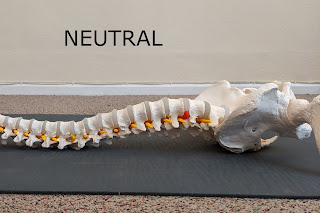To tilt or not to tilt – that is indeed the question
I suspect, anyone who has gone to either yoga or Pilates have
been told about pelvic tilting. I certainly bang on about it both in my clinic and
when I teach yoga. So why is pelvic tilting so important?
I suspect one of the reasons why so many people talk about
it is because most “normal” people haven't got a clue how to do it. Secondly, its
actually quite a hard thing to teach someone to do, as it requires very fine
motor control to do it well. And there it is, one of the most important reasons
for learning to pelvic tilt well – fine motor control.
By learning to very accurately and precisely tilt the pelvis
you can then make many other exercises safer and more effective. And as a side
effect of this you are building up your core muscles – now that is a good side
effect if I ever saw one.
So, this post comes partly from my own failure to teach this
well to other people. Also, I thought if I put a quick post and video together it
would hopefully make more sense. In essence a pelvic tilt is actively controlling
the roll/pitch of the pelvis in whatever position you find yourself in.
So lets have a look:
We will use semi-supine as this is the easiest way to learn how to to this - in a later post I will show you how to use it in other postures. It is important that the movement is initiated from the core and low back and not driven by the legs - more info in the video at the bottom.
Neutral spine - this is where you land if you lie semi supine on a hard surface like a floor. this will be different from one person to the next.
here is my flexible spine in neutral.
and me in Neutral
Anterior Pelvic Tilt - this is where you roll the front of the pelvis away from your head towards your feet. This will make your low back arch up away from the floor.
Here is my flexible spine in anterior pelvic tilt
And me in anterior pelvic tilt
Posterior Pelvic Tilt - this is where the front of your pelvis is coming towards your head and back is flattening into the floor.
Here is my flexible spine in posterior pelvic tilt
And me in posterior pelvic tilt
Now as you can see from the pictures it is not always easy to demonstrate this. The pictures of me are not that different, but hopefully having the model next to it will make it a bit easier to understand.
It is not a complicated movement once you get the hang of it. just try it at home on the floor.
I have also attempted to put a quick video together to illustrate it further.
Do have a go and let me know how you get on. remember to subscribe to the blog while you are here.
Thank You
Thomas
Do have a go and let me know how you get on. remember to subscribe to the blog while you are here.
Thank You
Thomas






Osteopath is really beneficial when it comes to health wellness. Avin Patel
ReplyDeleteuse acupuncture to complement the osteopathy that is really beneficial.